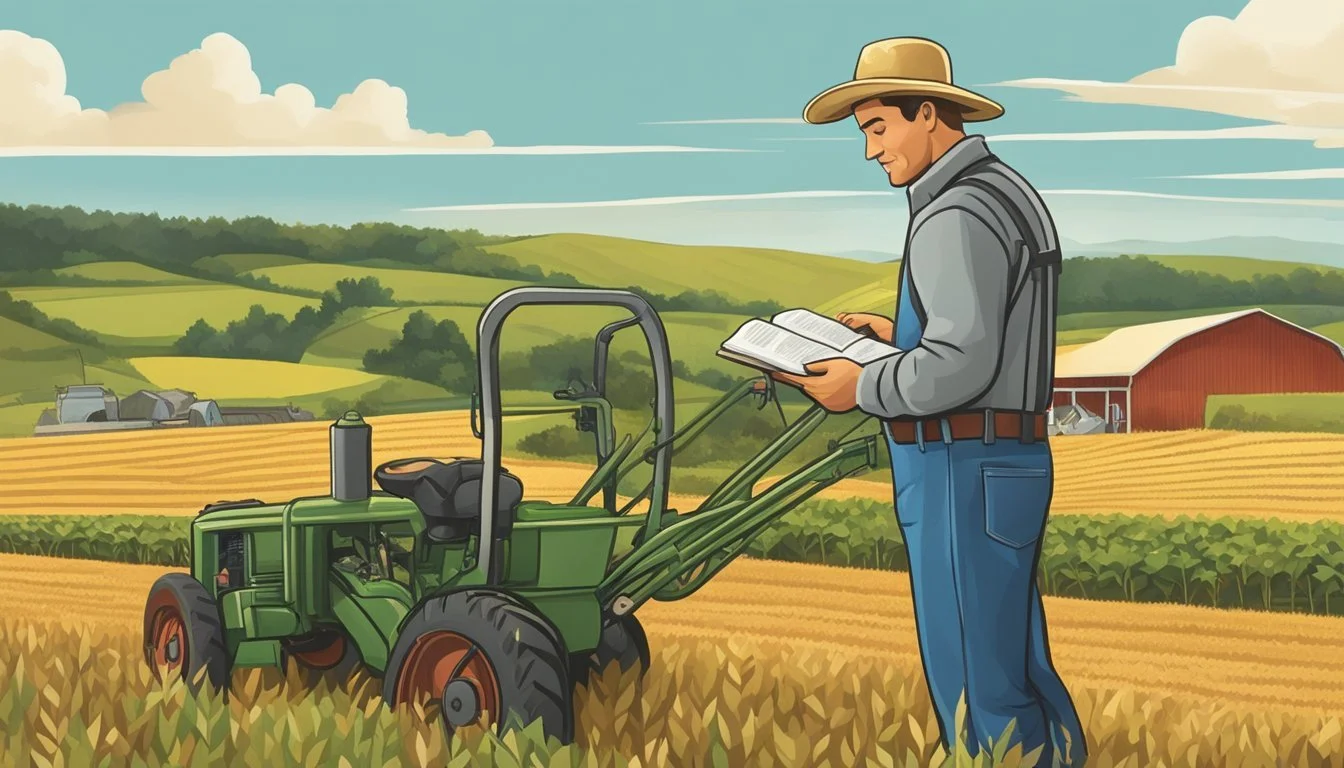Guide to Farming in Kentucky
Essential Tips for Success
This Article is Part of Our State by State Farming Guide
Kentucky's landscape, rich with fertile soil and diverse climates, presents an excellent opportunity for a variety of farming practices. Agriculture plays a pivotal role in the Bluegrass State, contributing significantly to the economy and the sustenance of its communities. With a history deeply rooted in the cultivation of tobacco, the state has since diversified its agricultural offerings, thanks in part to initiatives stimulating markets for Kentucky's products, adding value, and exploring new opportunities within the sector.
Farmers in Kentucky have access to a wealth of resources aimed at increasing net farm income while impacting tobacco farmers, tobacco-impacted communities, as well as the broader agricultural spectrum. The state encourages innovation in agriculture, providing support for both established and beginning farmers. Aspiring agriculturalists, especially those with less than ten years of experience, are offered realistic plans and guidance for creating sustainable farming operations.
Soybeans, (how long do soybeans last?) recognized as a particularly lucrative cash crop, exemplify the adaptability of Kentucky's agriculture. They thrive in the state's cool springs and falls, allowing farmers to extend growing periods and potentially achieve multiple harvests annually. This low-maintenance crop is part of a broader trend toward diversification, including cultivation of grains, forages, and the use of cover crops—each adapted uniquely to Kentucky's varied agricultural zones, ensuring that farming practices align with the ecological conditions to maximize productivity and sustainability.
Understanding Kentucky's Agricultural Landscape
Kentucky's agriculture is diverse, bolstered by its rich natural resources and favorable climate. This sector plays a critical role in the state's economy, with various crops and livestock being central to Kentucky's agricultural output.
Key Crops and Livestock
Crops: Kentucky's farmland predominantly yields vital cash crops such as corn and soybeans. This state is also known for its production of dark-fired tobacco and quality hay for livestock.
Corn: Utilized in food products, ethanol, and as feed.
Soybeans: Harvested for oil and animal feed.
Livestock: Equine and cattle farming are deeply ingrained in Kentucky’s culture. The state is famed for its horse breeding, particularly thoroughbreds for racing, and substantial cattle herds that contribute to the meat industry.
Horses: Concentrated in the Bluegrass region; critical for sport and leisure.
Cattle: Range from beef to dairy, spread across the state's farmland.
Natural Resources and Climate
Kentucky’s climate and natural resources create an environment conducive to farming. Its ample rainfall and fertile soil aid in the cultivation of various crops. Kentucky experiences four distinct seasons, which allows for a range of agricultural activities throughout the year.
Role of Agriculture in Kentucky's Economy
Agriculture significantly impacts Kentucky's economy. It provides income for families and creates jobs, both directly on farms and indirectly through associated industries like food processing and equipment manufacturing. Farms in Kentucky average around 179 acres and contribute to a large portion of the state's earnings, with sales of less than $10,000 being common among smaller family farms.
Starting a Farm in Kentucky
Those looking to start a farm in Kentucky can benefit from a range of resources tailored to support beginning farmers and assist in the crucial stages of planning, securing funds, and making informed crop and livestock decisions.
Planning and Research
Effective planning and research are fundamental to the success of new farming operations. Prospective farmers should meticulously evaluate their goals, assess the regional market demand, and understand Kentucky's diverse climate conditions. The Kentucky Center for Agriculture and Rural Development (KCARD) offers tools, such as a Farm Financial Risk Tool, to estimate start-up costs and analyze financial returns under various scenarios. Additionally, the Beginning Farmer and Rancher Development Program focuses on creating realistic plans for sustainable farming and income.
Access to Capital and Funding Opportunities
Securing adequate capital is a significant hurdle for new farmers. Kentucky provides several programs to help overcome this challenge. The Kentucky Agricultural Finance Corporation (KAFC) facilitates the Kentucky Beginning Farmer Loan Program, offering loans to develop, expand, or buy into farming operations. Moreover, the Kentucky Department of Agriculture (KDA) encourages participation through financial assistance including grants like the Kentucky Proud Promotional Grant. To be eligible for these programs, registration with the Kentucky Proud initiative is typically required.
Selecting Suitable Crops and Livestock
Selecting the right crops and livestock for farming in Kentucky is dependent on various factors such as soil quality, climate, and market demand. Kentucky's agricultural landscape allows for a diverse array of farming operations. Beginners must closely align their choices with their business model and the Kentucky Agricultural Development Board's guidelines to ensure the operation's sustainability and alignment with the state's agricultural objectives. Collaboration with USDA service centers and state coordinators can provide personalized advice for selecting suitable crops and livestock, as well as guidance through the USDA's procedures.
Best Farming Practices in Kentucky
Implementing effective farming practices is crucial for sustainable agriculture in Kentucky. These practices boost yields, enhance soil health, and increase the resilience of crops to pests, diseases, and extreme weather.
Soil Management and Crop Rotation
Kentucky farmers recognize the benefits of soil management and crop rotation in maintaining soil fertility and reducing disease occurrence. Strategies include:
Cover Crops: Planting cover crops such as clover or rye to protect and enrich the soil.
Soil Testing: Regular soil testing to determine nutrient levels and tailor fertilization strategies.
Crop Rotation: Rotating crops such as vegetables with legumes to manage nutrients and disrupt disease and pest cycles.
Pest, Disease, and Weed Control
Effective control practices ensure the health of crops and high yields. Farmers use:
Integrated Pest Management (IPM): Combining biological, cultural, and chemical methods to manage pests.
Resistant Varieties: Selecting crop varieties with natural resistance to local pests and diseases.
Herbicides and Pesticides: Applying herbicides and pesticides judiciously, with attention to the timing and method of application to minimize adverse effects.
Water Conservation and Management
Water resources are critical for farming, especially during periods of heat and drought. The following practices are essential in Kentucky:
Irrigation Technology: Utilizing drip or pivot irrigation systems to reduce water usage.
Water Capture: Implementing rainwater capture systems to supplement water supply.
Mulching: Applying mulch to conserve soil moisture and regulate soil temperature.
Innovative Farming Techniques
In Kentucky, farmers are transforming their operations by incorporating vertical gardening and advanced farming tools to maximize yield and efficiency while utilizing less space.
Vertical Gardening and Space Maximization
Vertical gardening is an innovative approach that allows farmers to grow crops such as tomatoes, cucumbers, squash, and peppers in a vertical space. This method is especially beneficial in areas with limited land. They employ structures like raised garden beds and trellises to train plants upwards, which not only saves space but also can lead to an all-summer harvest. Benefits include:
Increased Plant Density: More plants per square foot.
Improved Air Circulation: Reduces the risk of disease in crops.
Ease of Harvest: Simplifies the process of managing and collecting produce.
Examples of Vertical Gardening Implementation:
Crop Type Structure Used Benefits Gained Tomatoes Trellises/Stakes Better sun exposure Cucumbers Wire Cages Easier picking Squash Vertical Frames Improved air flow Peppers Hanging Baskets Space conservation
Adopting High-Tech Farming Tools
Kentucky farmers are also adopting high-tech farming tools which incorporate technology into everyday agricultural practices. Robotics and precision farming tools streamline tasks such as sowing, harvesting, and data collection. These tools offer several advantages:
Efficiency: Automation increases the speed of operations.
Precision: Technology like GPS and drones deliver precise inputs for planting and crop management.
Data Analysis: Advanced software tools assist in making informed decisions based on data-driven insights.
Key High-Tech Tools Used in Kentucky Farming:
Robotics for livestock and crop management
Sensors for soil moisture and nutrient levels
Drones for aerial surveillance and crop health monitoring
By adopting these innovative techniques, Kentucky's agricultural landscape continues to evolve, capitalizing on the benefits of modern technology and strategic space management.
Navigating Business Aspects of Farming
Navigating the business aspects of farming in Kentucky requires understanding market dynamics, complying with regulations, and efficiently managing farm operations and labor. These foundational elements are essential for the profitability and sustainability of a farm business.
Marketing and Selling Produce
In Kentucky, farmers have the opportunity to sell their products through a variety of channels. Farmers markets are popular venues where they can directly market and sell their produce to consumers. Building relationships with local businesses and participating in cooperative extensions can also provide valuable insights into current market trends and consumer preferences. Here, projecting revenue and understanding consumer demand are key.
Direct Sales Channels:
Farmers markets
Community-supported agriculture (CSA)
Farm stands
Wholesale and Retail:
Grocery stores
Restaurants
Schools
Understanding Regulations and Compliance
Farmers must adhere to state and federal regulations to legally operate their business. This includes food safety, employee labor laws, and environmental standards. The University of Kentucky's Cooperative Extension offers guidance and resources to help farmers understand and comply with these legal requirements. Compliance ensures that the farm operates without disruptions from legal issues, ultimately safeguarding the business's reputation and longevity.
Key Regulations to Consider:
Food safety standards (e.g., FSMA)
Worker protection standards
Environmental regulations
Farm Management and Labor
Effective farm management involves the careful coordination of physical and human resources. Kentucky farmers must develop strong labor management practices to maintain productivity and worker satisfaction. Integrating technology and farm management software can streamline operations and record-keeping. Additionally, tapping into the expertise of cooperative extension specialists can lead to improved economic analysis and financial planning for the farm.
Management Tools:
Financial planning software
Economic analysis reports
Benchmarking data
Labor Considerations:
Fair labor practices
Seasonal labor needs
Training and development
Support and Resources for Kentucky Farmers
Kentucky offers a robust network of support and resources for its agricultural community, aiming to enhance farm income and ensure sustainable farming practices. These resources span from educational services to development programs, addressing the diverse needs of the state’s farmers.
Kentucky Cooperative Extension Service
The University of Kentucky Cooperative Extension Service operates as a key source of research and knowledge for farmers across Kentucky. It focuses on providing practical, research-based information to address local issues in agriculture. By bridging the gap between Kentucky's farmers and the latest agricultural research, the service helps improve productivity and sustainability.
Agricultural Development Programs
Agricultural Development Programs in Kentucky are designed to stimulate markets for Kentucky agricultural products, add value, and explore new agricultural opportunities. The Kentucky Agricultural Development Board allocates funds to innovative projects that have the potential to boost net farm income, particularly projects that can positively affect tobacco farmers and communities impacted by the decline in tobacco production.
Educational Initiatives
Educational initiatives in Kentucky are centered around increasing the knowledge base of the state's agricultural professionals. The Kentucky Department of Agriculture partners with public health and educational institutions like the University of Kentucky College of Agriculture, Food and Environment to offer resources such as the Kentucky Farmers’ Market Manual. This comprehensive guide is vital for market managers and vendors, discussing topics such as Good Agricultural Practices (GAPs), organic certification, and market management.
Dealing with Environmental Challenges
Kentucky farmers face the dual tasks of adapting to weather extremes and implementing sustainable practices to cushion against climate impacts. These strategies are essential for preserving the state's natural resources and ensuring the viability of its agricultural sector.
Preparing for Weather Extremes
Kentucky's agricultural success hinges on effective management of weather extremes. Cold weather can severely impact crop health, potentially killing delicate plants or slowing the growth of more hardy varieties. Farmers must anticipate and prepare for droughts as they can devastate crops by depleting water resources. Techniques such as water conservation, irrigation scheduling, and selecting drought-resistant crop varieties are vital. For instance, by using cover crops in winter, farmers can protect and nourish the soil, as these low-maintenance plants prevent erosion and enhance water retention.
Sustainable Practices to Mitigate Climate Impacts
The introduction of sustainable agricultural practices plays a pivotal role in mitigating environmental challenges. Conserving water through improved irrigation systems and rainwater harvesting helps in maintaining the balance of natural resources. In addition, planting diverse crops that thrive in varying conditions can provide stability amidst changing weather patterns. For example, integrating plants that are natural cross-pollinators can improve biodiversity and resilience. The management of pests, such as aphids, through non-chemical means such as predatory insects is also essential for protecting crops without harming the ecosystem. By employing these sustainable techniques, Kentucky's agriculture can continue to thrive despite the evolving climate impacts.







